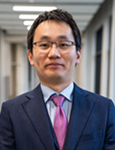Research
Contact
Communications Specialist
Faculty of Engineering
Spencer Engineering Building
Room 2072
Western University
Tel: 519-661-2111 ext. 87015
Email: engineeringcomms@uwo.ca
The Engineer's Impact - Tianlong (Taylor) LIU
Your inside look at faculty’s research and its effect on society
In this new Q&A series, we’ll feature Western Engineering faculty members to gain a succinct overview of their research, understand its impact on society, and discover intriguing little-known facts.
Meet Chemical and Biochemical Engineering Assistant Professor Tianlong (Taylor) Liu.
 Can you describe your research?
Can you describe your research?
Our research is all about using the power of artificial intelligence (AI) to solve complex problems in the world of chemical and biochemical engineering. Think of it as teaching computers to be super-smart problem solvers. For instance, right now, we're creating a virtual copy of biochemical systems. These systems are like tiny power plants that use microbes to generate electricity from wastewater. Our goal is to make them even more efficient. To do this, we're using AI to build a clever virtual version of these power plants inside a computer. This virtual version helps us understand how the real ones work and makes them produce more electricity and clean wastewater better.
How does your research impact society in everyday life?
Our research has the potential to impact society in several ways. Firstly, by applying emerging AI techniques to traditional areas like wastewater treatment, we can make the processes more efficient and cost-effective. Our current research can lead to cleaner and more efficient methods for treating wastewater. By improving the efficiency of bioelectrochemical systems, we can potentially provide a novel waste-to-energy solution and generate more clean energy from waste. This could mean less reliance on fossil fuels and lower energy bills for all of us. Additionally, these AI models we're developing can also be applied to many other fields, from energy production to environmental cleanup. So, it's also about finding smarter ways to solve various complex problems that affect our daily lives. Ultimately, this research can contribute to a greener and more sustainable future.
What inspired you to research separation technology and its potential applications in reducing greenhouse gas emissions and improving various industries?
An interesting and perhaps lesser-known fact related to our research is that microbes have incredible capabilities. They can perform tasks like breaking down organic matter and producing electricity, which are crucial for processes like wastewater treatment and sustainable energy generation. Microbes are nature's tiny powerhouses, and harnessing their abilities through bioelectrochemical systems is a fascinating and innovative approach to solving some of our environmental and energy challenges. It's like using the smallest workers in nature to help us create a cleaner and more sustainable future. Another interesting thing is that AI can uncover hidden patterns and solutions that may not be obvious to humans. Sometimes, AI models discover smarter ways to perform chemical reactions or optimize processes that researchers hadn't considered before. It's like having a creative problem-solving partner in the form of a computer program, and it often leads to surprising and innovative solutions.

